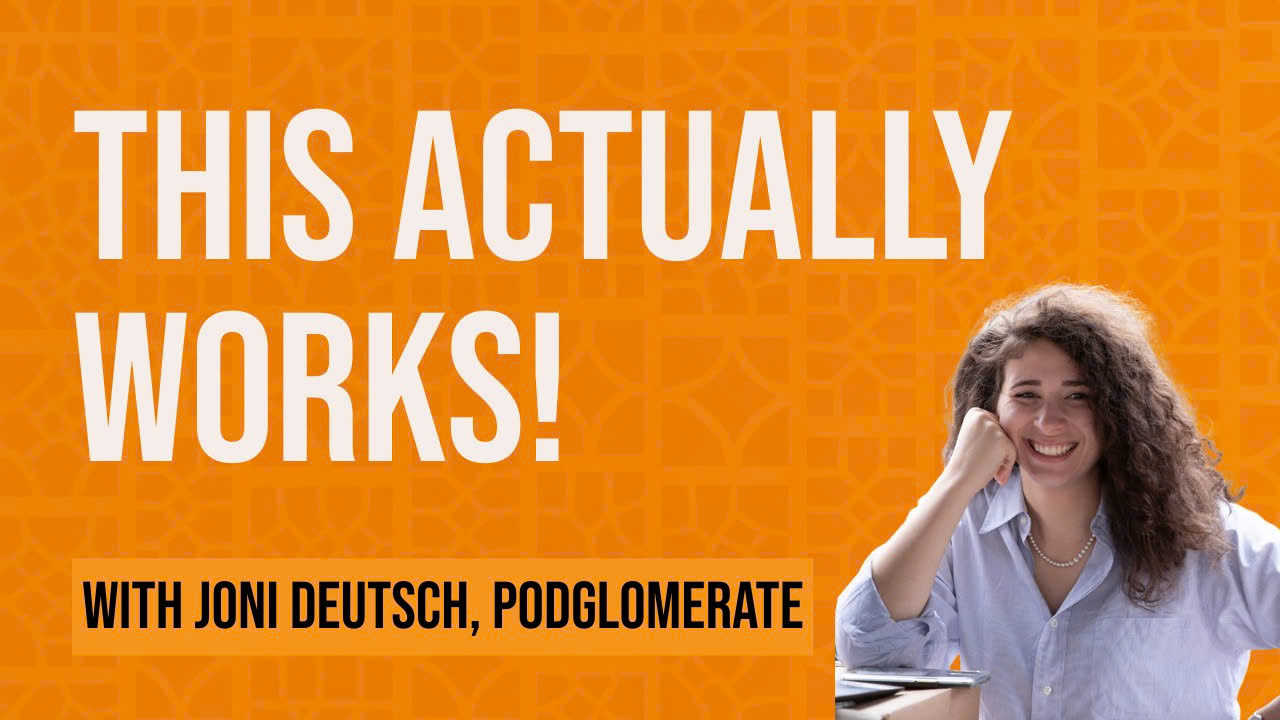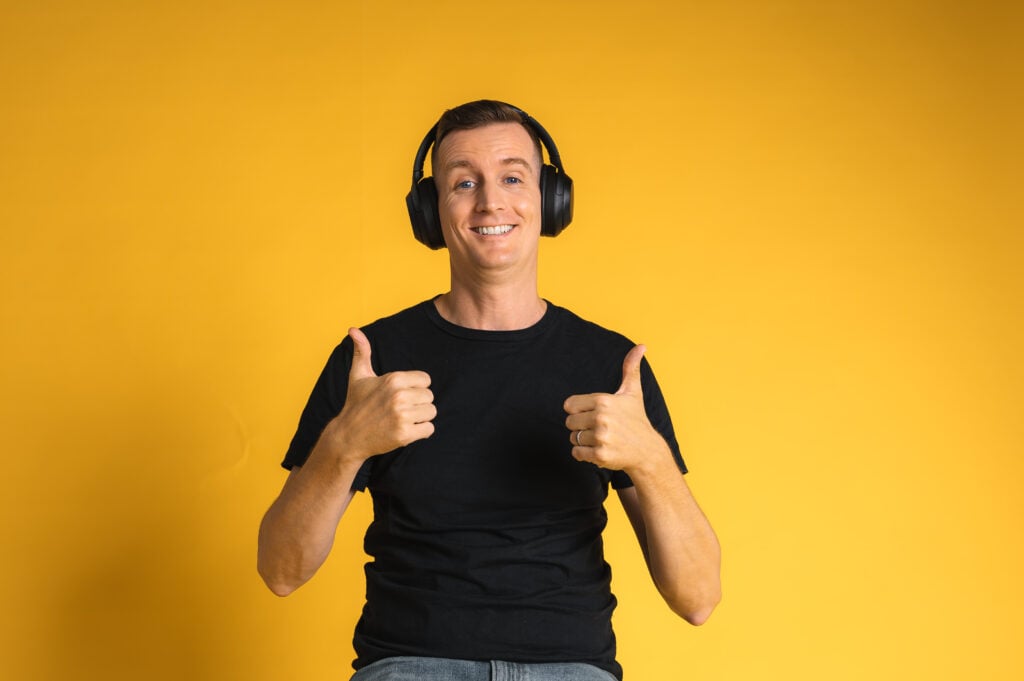My name is Niall Mackay, The Podcast Guy. When I started my first podcast back in 2019, I didn’t know much about marketing. I was lucky to grow it organically, but the podcasting world has changed a lot since then. There are millions of shows now, and listeners have endless options.
That’s why I wanted to talk to Joni Deutsch, the Senior Vice President of Marketing & Audience Development at The Podglomerate. Her company works with top names like NPR, Netflix, Harvard, and The Boston Globe. They know what it takes to get people actually to hear your podcast, not just make one.
This conversation reminded me that podcast marketing isn’t about chasing numbers — it’s about building genuine connections with your listeners and being consistent. Here are some podcast promotion tips I’ve learned.
The Reality About Podcast Growth
Joni said that years ago, maybe you could make a podcast, upload it, and somehow people would discover it. But that’s not true anymore.
The podcast world changed after Serial came out in 2014. That show made podcasting mainstream, and after that, everyone wanted to make one. The number of podcasts exploded. Now it’s harder than ever to stand out.
Joni said something simple but powerful: having good content is not enough. You need to know who your audience is, where they are, and how to reach them. Otherwise, you’re just hoping someone finds you by luck.
I’ve seen this myself. People come to me for podcast coaching and ask how to get more downloads. They want to know how to make their show go viral. But there’s no magic button. The shows that grow are the ones that treat marketing like part of the creative process.
If you think about it, that’s how everything works. Even Coca-Cola, one of the most recognizable brands in the world, still spends millions every year on marketing. Not because people don’t know who they are, but because staying visible takes effort. Your podcast is no different.
The Truth About Fake Podcast Growth
Almost every podcaster has received those messages. “We can promote your podcast organically on Apple and Spotify.” They sound tempting, especially if you’ve been struggling to grow your numbers. But they’re scams.
Joni and I talked about how these services often use bots to inflate download numbers. I know someone who tried it once. He was so excited about all the new “listeners” he suddenly had. When I checked his stats, I saw that ten percent of his audience was from Bangladesh.
Those weren’t real listeners. And as soon as he stopped paying for the fake promotion, the numbers dropped.
It might feel nice to see your download count jump, but fake growth is empty. It doesn’t lead to engagement, reviews, or sponsors. In fact, it can make you look worse. Advertisers today can see where your audience comes from and how they behave. If they notice that your listeners are bots, they won’t work with you again.
How Real Podcast Marketing Works
Joni shared so many great ideas that actually help podcasts grow in an honest and lasting way. None of them were complicated or expensive. They all came down to understanding your audience and being consistent.
1. Know your listeners
The first step is knowing who you’re talking to. What do they care about? Where do they spend time online? You can run a short survey or just ask them on social media. Knowing this helps you decide where to promote your show and what kind of content connects best.
2. Make your podcast easy to find
Think about how your podcast looks and sounds to someone new. Do your title and artwork clearly tell people what your show is about? Is your description simple and interesting? Small details like this matter more than most people think.
3. Cross-promote with others
Joni said one of the best free marketing strategies is cross-promotion. Find other podcasters with similar audiences and support each other. You can guest on each other’s shows, swap shout-outs, or share each other’s episodes in newsletters. This works because you’re reaching people who already love podcasts.
4. Use data to learn
I learned something new from Joni during this episode. She talked about “pixels” — small bits of code that help track podcast ads. They show if someone listened to an ad and then visited a website. It’s like a cookie for audio. I had never heard of this before, but it’s a game changer for measuring what’s working.
5. Build relationships, not just numbers
Joni said something that really stuck with me. She encouraged podcasters to spend just five minutes each week reaching out to people in the industry — writers, producers, or other hosts. Building relationships can open doors that data never will.
Spend Smart, Not Big
When I asked Joni about running ads, she said something simple but smart: “Why spend money on Facebook when your audience is already in podcast apps?”
That made so much sense. If people are already listening to podcasts, that’s where you should advertise. There are apps like Pocket Casts and Podcast Addict where you can run affordable ads directly to podcast listeners. It’s much more effective than trying to convince random people on social media to start listening.
Joni also said that if you’re going to buy ads, host-read ads are the best. When a host recommends your show in their own voice, it feels natural and trustworthy.
And if you don’t have a big budget, don’t worry. Most podcasters don’t. Focus on building connections and cross-promotions first. Those cost nothing but can deliver great results.
Be Consistent, Not Perfect
One of my favorite things Joni said was this: “Marketing is like brushing your teeth.” You don’t do it once and forget about it. You do it every day.
She’s right. Podcast marketing isn’t something you do only when you release a new episode or season. It’s a habit. Even small actions, done regularly, make a big difference over time.
Maybe you spend ten minutes each week updating your descriptions, posting a clip, or messaging another podcaster. That’s all it takes. It’s not about doing everything perfectly. It’s about doing something consistently.
When I started Seven Million Bikes Podcasts, I didn’t have a huge plan. I just had a passion for podcasting. Over time, I learned that passion isn’t enough. You need a routine. You can hire people to edit, mix, and post, but you can’t outsource your passion for growing your show. That has to come from you.
Conclusion
My chat with Joni Deutsch was one of those conversations that stayed with me long after we stopped recording. She reminded me that podcast growth isn’t about luck or quick tricks – it’s about clarity, care, and consistency.
Marketing your podcast doesn’t have to be complicated or expensive. It’s about knowing who you’re talking to, making your show easy to discover, and showing up for your audience week after week.


